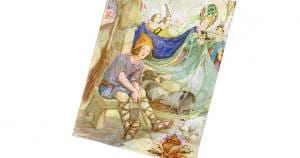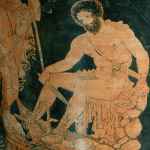 God save the swineherds.
God save the swineherds.
If you have read the excellent Prydain series, and you should, then you already have a fondness for pig keepers. The baths of Bath were founded, legend says, by a pig keeping British king who saw the benefits of the waters on the swine of the area. In the fairy tale The Swineherd, the wisdom of the (sort-of) swineherd teaches a princess Christian charity and humility. The Lord Jesus Himself has the prodigal in his parable of the prodigal son reduced to sitting with swine and there he learns wisdom. Jewish people may not have eaten swine, but they knew a good literary image when they found one.
The pig keeper as hero is very ancient, going back to Homer’s Odyssey. In this epic poem the pig keeper Eumaeus, whose name indicates he is good at finding, is the first mortal to find the good king Odysseus when he returns home from his adventures. The swineherd fights with the hero and frees the land of Ithaca from the noble louts who are wasting all her resources. Homer is not subtle: the pigs are in the palace trying to win the Queen and the King will need a pig keeper to clean up the mess.
The “nobility” of Ithaca is worse than useless. They consume the resources of the court and do nothing but engage in loutish games. They are not generous with the poor or with strangers. They spend years trying to win Queen Penelope for her beauty, money, and power. Meanwhile, the region suffers. Even Odysseus’ son, Telemachus, is trapped in childhood into his twenties, stuck at home with Mother kept from adventure or anything productive. One of the few to escape the decay of Ithaca is Eumaeus who keeps his swine, growing the herd, and doing his duty. He is heroic long before he helps restore Odysseus to power. People mock his job, but Eumaeus herds his pigs and gains nobility in the effort.
Homer shows the nobility of work, even swine herding, and the evils of idle wealth.
Ithaca is in trouble not just because her good ruler is gone, but because those who should have governed in his absence take a twenty year holiday. Something is rotten in the city of Ithaca. Odysseus and his father are close to the land and the work of the city. Odysseus himself has done his duty as king over decades of war and suffering to get home. He has returned with hard earned treasure to enrich the people.
Odysseus is a man of work. He and his father can do the work of farming. The suitors, the idle rich, do not understand, and mock the work that feeds them.
Odysseus is recognized several times in Ithaca by the scar he has from an attack from the tusks of a boar. This wild pig-like monster nearly killed him, but Odysseus recovers. He has an identifying scar, but the hero survives. Odysseus returns to unite with his swineherd. The pig keeper Eumaeus represents the taming of the feral or monstrous nature. The pigs have been made part of the city! Now the boors in the palace, feral boars, must be defeated or the city will be ruined.
This Labor Day our nation needs more faithful swineherds, leaders who work from the bottom up, and fewer credentialed swine in power now.












